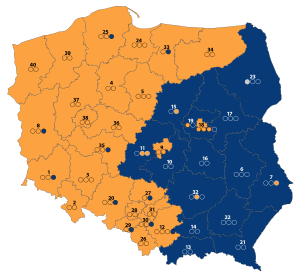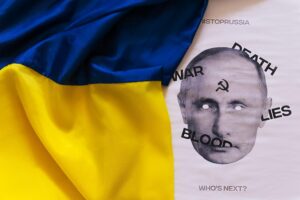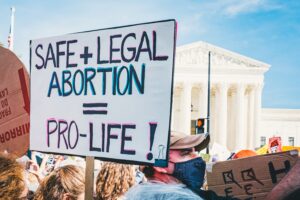Poland: A Nation Divided

"The longest eclipse in the history of Poland" by Polish cartoonist Herl
In recent years, Poland became notorious for being, along with Hungary, a black sheep of the European Family. Since the Law and Justice party PIS ( Prawo i Sprawiedliwość) took power, Poland has been treading the route towards becoming a more authoritarian regime. Right now, it has reached a point of political absurdity that I thought I would never witness in my life. The current political situation resembles the absurdity of the late 1970s of Communist Poland. My parents and grandparents saw it firsthand.
I am not trying to equate the rule of PiS to the communist dictatorship of PZPR (Polish United Workers Party aka Polish Communist Party). What I am trying to say is that PiS and PZPR share some similarities like widespread corruption, nepotism, and cronyism of those in power. Then, there are elements of near-total control over public media and scaring society with the type of boogeyman, each year. I could mention far more similarities here. However, I won’t stray any further from the main subject for the sake of this article.
After Andrzej Duda became president of Poland in 2015, PiS assumed complete control over the government’s legislative and executive branches. Shortly after they started an assault on the courts. After taking control of the judicial branch, PiS began pushing for its vision of Poland. A Poland that is rooted in fear of God, and traditional values. At the same time, this version of Poland rejects modernity and finds comfort in deeply entrenched ignorance, pandering to the Polish nation’s worst qualities. In short, that is the vision of Poland by Mr. Kaczyński. What he calls the Fourth Polish Republic.
On the other side of the political barricades that divide the nation, we have the opposition and some of the Polish people who are tired of the ludicrous reign of Mr. Kaczński and his brainless cronies. People who want to see a Poland that is a part of the European family. They view Poland as secular, inclusive, and a place where people can be whomever they want to be.

Polish society has not been divided like this for many generations. The last time society was divided like this was after the end of WW2 when communists took over. Currently, Poles fight an ideological war against each other. This fight has split friends and families apart. The split in society goes along different lines, such as education, geography, interpretation of the Church’s role in society, etc. Yet, the most significant rift is created between different generations. Older people find comfort in the Catholic Faith and traditional values. The younger generation typically is not that different from their western European contemporaries. The closest analogy that I can think of is the current polarization in American society. It mirrors the polish situation well enough to give the reader an understanding of what is going on. If someone wants to gain a deeper understanding of the divisions in Poland, I recommend further readings here, here, and here.
It is important to remember that there is a third side to this conflict, a silent player. A power broker that helped Polish people to survive as a single nation when there was no Poland. An organization powerful enough to resist the communist rule of the Polish People’s Republic. I am speaking here about the Polish Catholic Church, which for centuries has been the backbone of Polish society in times of need, and a hindrance to progress in times of prosperity. When Poland was under occupation until the start of WW1, religion and polish culture strongly intermixed during the centuries of partitions. The lines blurred so much that you can’t say you’re an excellent Pole if you’re not a Catholic.
Throughout the 19th century, the Catholic Church became the repository of Polish culture, allowing the Church to gain an insane amount of influence over Poles in generations to come. In the inter-war period, the Polish Catholic Church would stifle some of the more progressive ideologies. And soon after WW2, opposition to communist rule would yet again center around the Church. It is essential to mention the prominent leaders of the opposition, who later became essential politicians in the Polish landscape of the 1990s and early 2000s. Both Mr. Kaczynski and Mr. Tusk come from this setting.
The Polish Catholic Church allowed the populistic vision of the PiS to spread and poison the minds of Poles. This Kaczyński’s vision of Poland somewhat benefits the Church greatly and gives it a more significant role in society than it has now. For PiS, the Church is a repository of Poland’s moral teaching: “The only alternative … is nihilism,” it said in a 2019 election campaign program.
Despite the fact that Poland has a constitutional separation of religion and state, the influence of the Polish Catholic Church on politics is immense. This is primarily due to the factors mentioned above: strong intermixing of religion and culture in the 20th century and the Church’s role as the leading opposition player against external threats. (i.e., foreign occupation, Communism). Nearly 87% of Polish people are baptized as Catholics. However, this number is on the decline, and the number of people attending church on Sunday is 36,7%. The number of young people attending mass is roughly at around 26%.
Finally, there is a third reason, which may be the core of the issue and that gave the Church unchecked moral and spiritual control over the minds of Poles. It was the Round Table Conference of 1989. A Round Table Conference was a series of meetings between the Polish United Workers Party and the opposition in the form of Solidaność. The Catholic Church would mediate the sessions. These meetings resulted in the peaceful transition of Poland from a communist country to a democracy.
One of the results of this transition was the so-called Great Compromise. The evidence of it in the Polish academic literature is very scarce, almost non-existent. I believe that this article is the only English text that will reference this.
One may ask, what is the Great Compromise? Is it some form of a grand conspiracy? In a way, yes, but not really. The Great Compromise refers to the negotiation stance of the PZPR during meetings of the Round Table Conference. It gave the Opposition and the Church almost free rein in shaping the vision of the future of Poland.
According to the vision set after the Round Table Conference, Poland was bound to become a free democratic country in this vision to join NATO and the EU. Which eventually happened, respectfully in 2000 and 2005. Poland finally once again became part of the West.
What does it have to do with Polish society’s current social polarisation and the Catholic Church? To maintain this vision and let Poland achieve these goals, someone needed to keep the peace at home and maintain the status quo during turbulent times. Someone had to keep society soothed and calm when the unemployment rate hit 25% and the quality of life worsened for virtually everyone in Poland. That role fell to the Polish Catholic Church. The organization that historically shepherded the nation in trying times, when Poland was not on the map of the world. Religion was the only force that commanded some form of moral authority to which every Polish person could relate. Thus the Church became the unofficial guardian of the polish society, once again.
It should be mentioned that the Polish Catholic Church in the 1990s was a different organization than it is now. It had a solid liberal wing represented by many high-ranking bishops and cardinals, and by John Paul the Second as the Pope. After the early 2000s, when society slowly became more liberal, the Church was going the opposite route. It became more conservative and entrenched in traditional values. Several factors contributed to this state of things, such as the death of John Paul the Second, the growing influence of Radio Maryja owned by the infamous preacher, father Rydzyk. The end of the Polish Pope was incredibly traumatizing for the Polish Catholic Church, which began to dwell on his memory and teachings, and completely ignored the developments in the outside world. Meanwhile, the Catholic Church outside of Poland became a more liberal and progressive organization.
The year 2005
After the year 2005, when Poland joined the European Union, one could say that the Church’s role in guiding the Polish people was over. If I were to be a believer, I would say this was a sign from God, a sign that Polish Church missed. (John Paul the Second died nearly a year after Poland joined the EU) The economy was booming, the unemployment rate for the first time in ages fell below 20%. The turbulent transition was finished. For the first time, it looked like things in Poland would take a positive turn. And if we look at things from the perspective of time, the quality of life in Poland improved significantly in the last 16 years.
However, the Church back in 2005 was still a powerful political player. Politicians from all over the spectrum, from left to right, would ask bishops and cardinals for favors. They would seek support from the Church. In return, the Polish Catholic Church would gain more influence over politicians. The influential role of the Church in politics, combined with the influence over the lives of over 33 million Catholics in Poland, made the Church a political force to be reckoned with. This sick and symbiotic relationship would continue for years. Neither the socialists nor Civic Platform nor any of the current opposition parties would question the Catholic Church’s role in Polish society. By doing this, the politicians gave it virtually unlimited power in the public sphere, where the Church should not have much influence.
Perhaps this relation between the Church and Politicians would continue uninterrupted. But the times change. The two young generations (Gen Y and Gen Z) of Polish people are overall less religious than their ancestors. They don’t necessarily remember or know how terrible communism was, or how difficult the 1990s were in Poland. Thus the grip of the Church has diminished over time. It could be added that another factor that contributed to the more minor (but still relatively consequential) role of the Church in society would be widespread allegations about pedophilia among the priests.
Young people were born in a free Poland. In a Poland, that eventually became part of the EU. And like many of their counterparts in other countries, young Poles share similar values to other young Europeans. The long shadow cast by the Church over the Polish bastion of the faith fades away. Young Poles are the ones who question the current status quo and want to break it. Only 9% of them view the Church in a positive light.
On the other hand, we have an older generation of Poles, who are more religious and susceptible to propaganda spewed on public television by PiS. They are more prone to fear-mongering because often they don’t understand the modern world. What is worth mentioning are the countless conspiracy theories that PiS and Polish public tv spread. The word ‘’gender’’ has been equated with treason and something unnatural. Polish, like many languages, uses the same word for sex and gender. Therefore English word ‘’gender’’ is used daily but is alien to many, especially older Poles. Then we have the infamous LGBT-free zones or the priests spewing lies about the nature of human sexuality, some in direct contradiction of the teachings of his Holiness Pope Francis.
The collision of these different worlds causes tremendous tensions in the society that we can observe nowadays. The polarisation of Polish society, the craziness of Mr. Kaczyński and his catholic Taliban, who terrorize women and civil society alike: all of this is done in an attempt to enforce Kaczynski and his cronies’ vision of the Polish Fourth Republic, which is the last remaining zombie of the Great Compromise. It is a zombie because it refuses to die peacefully. A relic of the past, which outlived its purpose and no place in modern society. The aim was to guide society through turbulent times. Now it only causes ill to the society as a whole.
I hope that one day I will be able to live in Poland that accepts different Poles. Not only the ones who fall under the stereotype of religious fanatics, with their hearts on the right side. But for that, the transformation will take time. However, when I am looking at the state of the society now, I often lose that hope.


